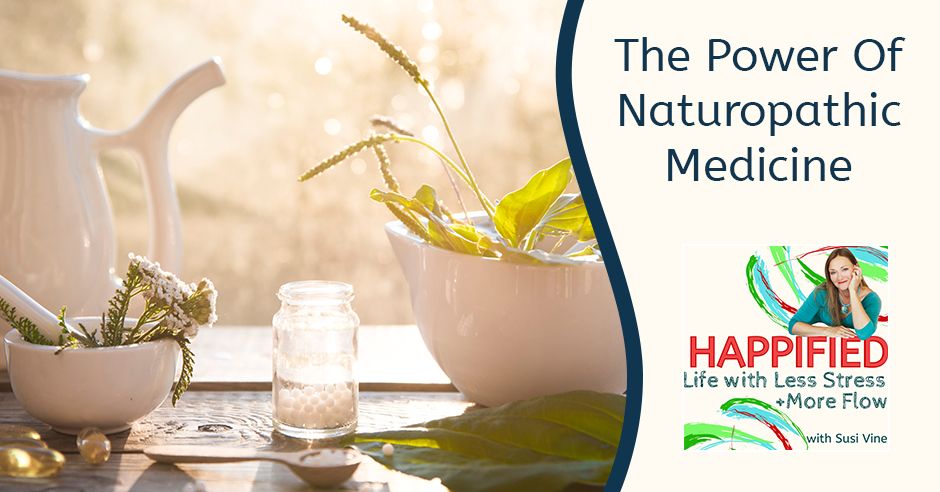
Naturopathic medicine makes use of natural remedies to help the body cure itself. Dr. Samantha Larkin, ND describes our overall health as a book, and each day is a page – we get to choose what we write on it! The story of our whole health is the result of the sum of those pages.
In today’s episode, Dr. Samantha and Susi Vine discuss:
- Bringing the body back to balance using the Therapeutic Order,
- How normal cortisol levels help us, and how dysregulation leads to trouble,
- Why starting with supplements may be the wrong order of support
- How avoiding tough feelings can lead to unhealthy habits,
- The simplest dietary recommendations for better health, and
- Starting where you are to increase activity and exercise.
Connect with Dr. Sam through her website NatureCureDoctor.com, on her Instagram, and her Facebook @naturecuredoctor.
—
Watch the episode here:
The Power Of Naturopathic Medicine
Dr. Samantha Larkin, ND joins me to talk about holistic support for stress. By addressing the body, mind + spirit, we can often prevent or reverse issues without calling on medical intervention. Learn how “slow medicine” can heal more deeply and completely than merely treating the complaint.
I am happy to share with you another installment from our library. I did a series of interviews earlier in 2021 as we were dropping into our sequestration during COVID times. This conversation with Dr. Samantha Larkin, a naturopathic doctor who was valuable then and I know it’s going to continue to be. I brought this one back to share with you as we discuss how cortisol can affect us, that stress hormone that affects us in many other areas of our lives and how naturopathic doctors address healing and balance through the therapeutic order. I hope you enjoy it and you can connect with Dr. Sam at her website, NatureCureDoctor.com. She is also on Facebook and Instagram dropping some insights and wisdom @NatureCureDoctor.
—
I am very happy to have with me a fantastic doctor of naturopathic medicine. Dr. Samantha Larkin is here to talk with us about how we can stay resilient and support ourselves in times of stress and when to recognize how to find the best care to support us. We’re going to cover some great topics for the course of our conversation but first, let me say that this is not medical advice. We are not here to prescribe or diagnose anything. We are simply making general recommendations and you should always work with your medical practitioner to make sure that something is suitable for you. With that in mind, Dr. Samantha Larkin, I’m happy to have you with me.
I’m pleased to join you, Susi.
Let me start in this conversation, perhaps, as we’ve talked about some people might not be familiar with what’s the difference between a naturopathic doctor, a medical doctor and other types of medical practitioners.
I went to four-year medical school and the first two years or more so, Biochemistry, Anatomy, Physiology, something similar to what you would see in an MD school. The second two years are the clinical years and those have a different focus for us. We’re learning more preventative medicine, much more nutrition, more herbal medicine and other modalities that are considered more traditional. We meld the conventional world well with the traditional and ancient ways of healing. You’re getting a huge amalgam of different treatment methods with a naturopathic doctor.

I appreciate that you’re pointing out that it is traditional medicine. We tend to see it put in the category of alternative medicine. I appreciate that even complimentary is becoming more widely accepted and used than alternative. It’s because it was put aside for only the last couple of decades, maybe 50 or 60 years, finally science is catching up with what evidence is born out in some cases up to thousands of years. I love that this is becoming more widely acceptable and available. In your practice in supporting people who find themselves under stress, what are some ways you help them recognize it? How do you discover this as an issue that’s affecting your patients?
A lot of patients come in with headaches, tension, pain, a variety of different concerns and when we sit down and talk, it comes down to stress and how all of these daily stressors, life events are compiling. What I find is that having a good way to measure that is super important with certain types of patients. What I’d like to do is first look at cortisol levels. Cortisol is your stress hormone. In a healthy person who doesn’t have a lot of stress going on in their life or someone who responds well to stress, that curve is going to be more of a bell curve. It’s going to go up in the morning to wake you up. This is an arousal hormone.
It will go up in the morning around 9:00 AM and then it will slowly come down. What we see with patients who are stressed out or have a lot going on or aren’t handling stress well is that the way that would be bottomed out their cortisol won’t have the energy to deal with life. They’ll have trouble getting out of bed or we’ll have patients who are super elevated and they always feel wrapped up. They can’t calm themselves down. What I also see is that spike will happen later in the day. Their body is telling them to wake up at night time and they get the surge of energy and all these things that they wanted to do but they can’t go to sleep. That is starting to compound their problems with stress as well because they’re not sleeping.
That’s the first place I like to do. We do four-point salivary cortisol. We take a saliva sample at four points during the day, space it out evenly, record that curve and see what that looks like. That gives us a ton of information. The other thing I like to do is take an objective scale of stress and there’s a good one that we use as medical practitioners which is called The Holmes and Rahe Stress Scale. It gives an inventory of different life events such as changes in a job, marriage, divorce or even things as small as a car loan. It goes through all of that on this scale and gives an objective value to each of them so you can monitor someone’s stress in an objective way and you can monitor their stress from appointment to appointment. It’s great to have those tools. That way you’re not just like, “On a scale of 1 to 10, how stressed are you?” That’s going to be different for everybody.
I appreciate you’re starting to bring attention to how in-depth these consultations are because when I visited a naturopathic doctor, the initial visit can be 90 minutes, maybe even longer depending on what you’re there to address. It can be funny some of these questions seem unrelated or off-topic but it’s all connected which is the beauty of this world of naturopathic medicine and functional medicine of these other modalities that are starting to become more mainstream.
I love that you made that reference as well because they can be quite lengthy, especially the initial appointments with a naturopathic doctor but I’ve learned that if you let your patient talk, they’ll tell you every question that you are going to ask them. It might be out of order but sometimes it’s nice to have a practitioner listen to you like that. That’s what we do is we listen and we do take into account the whole body, mind, spirit, everything’s connected.
In a case where you find someone has issues with the cortisol being out of balance, what are some general recommendations that you find are supportive in helping to come back into balance?
Listen and take account of the whole connection of body, mind, and spirit. Click To TweetIt depends on how whacked out your cortisol rhythm is and it can take a long time. This is slow medicine, this isn’t your fast quick-fix thing but it is very effective. One of the things I like to explain to my patients is we will treat on a least invasive to most invasive therapeutic order is what we call it. What we’ll do is we’ll start with removing obstacles to cure. What is in the way of your optimal health? A lot of these stressors are those things. You have a toxic job with toxic coworkers that you can’t stand. That job might have to go to even put a dent in starting to build your health. We start there and then we start to go through the foundations of health which are great nutrition, exercise and movement.
Do you have a support system? Are there people around you that are going to help you cope with the stressors that you can’t get rid of? When those people aren’t available, what do you have in place within yourself to cope with those stressors? Meditation, yoga, movement. What me and my partner do all the time is garden together and that’s been such a great source of bonding. It’s meditative for us both. That’s a great stress reliever. These things that maybe you can do with your support system but things that you could do personally that you don’t have to look to anyone else for that self-soothing. I try to go through those things with my patients first and then making sure that my patients aren’t over abusing alcohol or abusing drugs to cope with that stress because that is compounding and it won’t obviously help in the long run.
Addressing those things then we like to get into higher-order interventions such as nutritional supplements, vitamins, herbal medicine. If that’s not working then we might be talking about, “Is this stress? Is this starting to move into the realm of anxiety or depression? When was the last time you thought about killing yourself?” These are things that we ask because we want to know. Sometimes we have to check for red flags with our patients and sometimes those are there. It depends on the severity of the stress and how our patients are dealing with that.
I’ve heard it compared to peeling the onion. You have to work through layers sometimes to get to the root of a situation in order to resolve it. All of these provides such great support and boost our resilience so that we can meet stress because stress is going to happen. Sometimes we can address different stressors and minimize those. That supports us so that we have the resilience to meet stress when it gets served up because that’s going to be a part of life.
A lot of functional practitioners will compare it to that bucket analogy. All of these stressors are filling your bucket but when it starts to overflow, how do we talk about how to remove things from the bucket so that it doesn’t overflow next?
The bucket’s been getting a lot of use. It’s helpful and a good visual. Also, the frog in the pot of boiling water. We don’t tend to recognize how much weight we’re carrying until we take a pause. Maybe we go on vacation and we realize, “How does it feel to not set an alarm and let my body regulate its own sleep schedule?” To get out of what could be a toxic work environment and say, “I gain so much more fun for my partner to be with.” There’s a lot of trickle and spill-over effect and that’s the beauty of the traditional medicine is looking at that whole picture.
I’ve said also as an example, in massage, people tend to come in and they say, “I have pain in my shoulders,” and expect work to be on their shoulders. However, the source of that could be muscle tension across the front of the chest. That source is not always directly related to people. It’s easy to miss the cause when the result can seem removed. That’s the beauty in getting an outside perspective and somebody who has this amazing ability to draw from different modalities and traditions of medicine and healing to put together something that’s customized for you.

That’s the thing that sets us apart is our kind of doctor, we don’t have protocols. We don’t have things that are already put in place in a binder in the hospital for us to give to our patients no matter who they are, where they’re from or what their story is. We can pull from a toolbox that is vast of different therapies and personalize our treatment plans.
One other thing that stood out is you were talking then as you go through the therapeutic order you might get to and this isn’t the very beginning of the scale but along the process, it might be necessary to bring in some nutritional supplements or use some herbs for support. I love the ability in naturopathic medicine to look at a whole different set of testing and assessments that medical doctors don’t tend to look at. It’s examining the function of the body in every facet and recognizing imbalance in metabolism or all of these little things that they tend to be going, symptom equals prescription or diagnosis. Instead of recognizing where it starts along the chain, how that affects what hormone balance, function or physical ability to support the whole body.
We are good at fine-tuning things. Whereas one practitioner in a conventional setting might only order a cortisol level on someone they suspect has a disease like Cushing’s syndrome. We are using it as a tool to help people mitigate stress, revamp their HPA access, which is your brain to adrenal access. It’s a great tool. We take these tasks and use them to their full advantage. Your body is telling you a lot if you slow down and listen to it.
That’s another thing that I like with the timing of this and why I put this together quickly on the fly once I knew exactly what I wanted to share with people is because I hope that in this time, while the pause button has been pushed and we’re out of our normal cycle, be that commuting to a job or whatever it is that usually occupies our time and attention. Even if we’re still busy working at home, we can look for ways to build in a self-care practice to get in touch with how we’re feeling and how we want to be feeling, how we want to be able to engage in the world and start to cultivate the habits to support us being the person that we want to be without restriction.
There is no one-size-fits-all model for anyone. Click To TweetIt’s something that I wish was more prevalent. I’m glad that you’re bringing light to that. Especially at this time, I have a lot of friends and patients who have turned to alcohol as a way to self-suit because of boredom or stress. Instead, it’s important to take this time where we have slowed down, hopefully, most of us to realize, “I don’t want to sit with myself for a second. What’s going on? Is this a stressor that I haven’t identified? It’s important what you’re doing and I love that you’re doing this program.
A lot of times unhealthy habits come from avoidance. That’s an essential part of this whole self-reflection process and trying to decide. We’ll be talking about bringing in the emotions that we want to be fostering. We get to choose our own adventure. We are not subject to the influences of the world. We get to be active participants. Is there anything else that you would share in terms of general health and support? You mentioned nutrition. I talked with a nutritionist who is an advocate of whole food plant-based and plant-based isn’t for everyone. Some people thrive on animal protein. I’m not saying that that’s the way to be. It’s not the way that I can commit to eating but its general rules of thumb and you mentioned activity too. Any other favorites of yours that you recommend to people to keep themselves resilient?
Nutrition is one of my favorites. There is no one size fits all model for anyone but I believe as Americans, we should be eating less meat. We are eating way too much meat. When it comes to that, choosing our sources wisely is important. I’m very much an advocate of grass-fed, grass-finished meats, pastured eggs, make sure you’re getting organic milk, organic cheeses when you can. Beyond that, up your veggies. Plant-based all the way, less processed foods are going to make you more resilient to stress. They’re going to support your immune system. What I always love to tell people is to eat your colors. My favorite thing to talk about, “Eat your colors. When you’re putting together your plate, it should look beautiful. If it doesn’t, chances are you have too many starchy things on there and you need some color.”
That’s huge for me. When it comes to movement, it can be a scary topic for some people. They perhaps have never felt athletic. Movement can look like anything. It can look like a walk around the block for some patients. It can look like getting outside of your front door and walking to the sidewalk. That might be where you need to start when it comes to movement. A lot of patients are scared that, “I can’t run a mile. I can’t do that.” It’s a lot of self-doubts. What I like to say to people is, “Can you get to the end of your street?”
It builds confidence and they go, “Yes. I can do that. I can go around the block.” All of a sudden, they can’t stop walking or running because they’re loving it. When I say movement and exercise, I do mean whatever someone can tolerate. It could be yoga, swimming, perhaps walking and running is too difficult on your joints. I encourage whatever movement possible and that is so great for helping to regulate that HPA access, where that cortisol comes into play.

Thank you for that because people need more permission to take on the activity that feels approachable to them and naturally explores how that ability grows. Certainly in Southern California but in nowadays society, it seems like that divide gets further apart between sedentary people and very active people who are triathletes. People look at that example and say, “I could never do that.” You shouldn’t start there. You might decide after a couple of years of training that you can’t stop moving and you might find yourself there to your own surprise but celebrate those small wins, walk to the end of the block or around the block. Get an accountability buddy is another thing that I advocate because it helps, it’s easy to psych ourselves out of the game but it’s a lot easier for us to cheer other people on. If you’ve got a cheerleader in your corner, that’s helpful.
It plays into that support system as well that helps us mitigate stress. What I’d like to end on is I like to tell my patients, “Every day is a page in the book. You might not put anything in today’s page but tomorrow and the next day, maybe you’ll put one thing. Maybe you’ve added little greens to your dinner or you walked around the block or you walked for twenty minutes. Those are all things to put in the book. Once we have a full book, that’s the accumulation of what our health can be.” I know a lot of people who can be a little fatalist, “If I don’t do this every day this week then it’s not worth it.” I like to encourage every little win is huge when it comes to your health.”
Getting a good cheerleader in your corner, which is why I’m glad Dr. Sam was able to hop on with us. Thank you so much.
Thank you so much for having me, Susi. It was a pleasure.
It was a lot of fun for me too. Thanks for making some time and best of luck to you in your practice. Stay healthy, well and spreading that word. I’m glad you’re out there and doing your work. Thank you.
Take care, Susi.
Important links:
- NatureCureDoctor.com
- Facebook – Nature Cure Doctor
- @NatureCureDoctor – Instagram

[…] Dr. Sam Larkin, Naturopathic Doctor, on better lifestyle habits […]